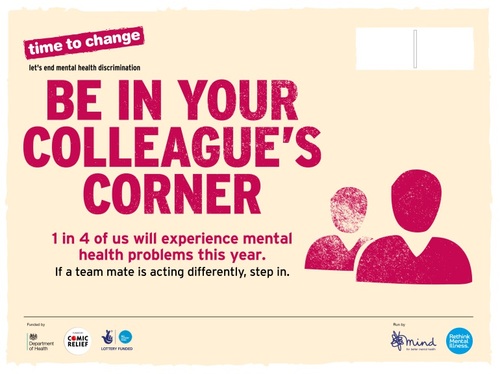Daily life and work stress can take its toll on our mental health and admitting that you are struggling and suffering with a mental health issue is most definitely a difficult step to take.
Not long ago I found myself having to take this step. There’d be days when I couldn’t focus, and was getting upset and this wasn’t great for me or my colleagues. By no means was it an easy step but there were some great starting points including talking to my friends, family, and local GP.
Maybe you’ve experienced days like mine, you’ve been through periods which are tough, or are going through one now? Firstly, know that you can make it through this, and that you’re not alone. Based on my experience, I wanted to write a couple of things about what has helped on my journey, and how you can implement certain things within the (recruitment) workplace to promote well-being and support mental health.
Small steps and process
Talking is obviously a huge step, and as I mentioned I started with those close to me; my family, my friends, and after that, my local GP.
Being able to receive insight into what it is you are going through and that there are others out that are also experiencing really helped, particularly in the understanding of why I was feeling the way I was. Based on this I found it really helpful to spend time reading books and articles focused on wellbeing and mental health from a scientific and holistic point of view, which further helped me to dig deeper and understand my issues better.
From there, I also started taking lots of other smaller steps to improve my well-being and support my mental health healing process which included:
- Spending my lunch breaks away from my desk and taking at least a short walk around our lovely Wimbledon area
- Going to the gym and sauna on a regular basis and improving my diet
- Visiting museums/galleries at least once a month
- Making sure that I challenge myself on a regular basis by trying something new (like taking Arial Hoops classes!)

Note: You don't need to have a mental health problem in order to feel the benefits of practising wellbeing! It means that you already have practical steps in place to ensure you are supported when you aren't feeling great. You may also find other things suit you better but whatever it is it’s taking these small steps that can help to begin to improve your wellbeing.
All the above contributed to an improved mood and productivity at work but one of the largest parts of my healing journey has been down to how the team and managers here at Eligo have listened, understood and supported me. Speaking to your employer about mental health is hard and I am lucky to have had such great support from them, particularly given that there is still the occasional stigma attached to mental health in the workplace – and recruitment industry.
The guys at hunted have done some wonderful things around Mental Health in Recruitment. You can read more about their mission and what they do here.
Similar to what Hunted are doing, Time to Change – an initiative led by Mind and Rethink Mental Illness aiming to end mental health discrimination - launched the Employer’s Pledge, a commitment to raising awareness of mental health in the workplace. It has been a fundamental pillar to creating cultural change and addressing mental health stigma in the workplace.

Take a closer look at the pledge here
Helping others
Work can be good for our health, but a stressful or negative working environment can also lead to physical and mental health problems. So, within the workplace, what have I found has helped me and are just some of the small things you can do to promote wellbeing and supporting mental health?
Stick it to stigma
Mental Health Awareness is on the rise with many national campaigns and more people talking about it, but people with mental health problems still face discrimination especially in the workplace.
Fear of discrimination and shame are top reasons why people don’t tell their colleagues about their mental health problems but by creating a workplace culture that allows people to be themselves, it makes it easier for people to speak out about mental health concerns without fear.

Support Colleagues
Talking and being an open book about your mental health can seem intimidating and when asked ‘how are you today?’ the easy answer is to say ‘yes I’m fine’ even if you’re not. Asking someone how they are doing and coming across as authentic and actively listening, means a lot to someone who is having a rough time.
If a person you are reaching out to is open to talk, arrange a time for a longer chat in a place that’s comfortable for them and away from the busy office.
As we spend so much time at work, often we see our colleagues more than our family members, therefore it’s extremely important to look after one another in the workplace and support each other if we notice our colleagues struggling. It might be difficult to start the conversation but you can find very useful tips here: https://www.time-to-change.org.uk/sites/default/files/rightplace-non%202018champpack.pdf

Educate others
A good way to promote good mental health and wellbeing is by educating others in your organisation about mental health. Breaking down what mental health problems are and ways of identifying people who may be struggling with mental health at work and by giving people positive reasons to disclose mental health issues, you can help to establish a culture that values authenticity and openness.

Here are some further education and sources around mental health and wellbeing;
- The Mental Health Foundation
- https://www.mentalhealth.org.uk/sites/default/files/how-to-support-mental-health-at-work.pdf
- Managing Mental Health: Introductory module for managers, developed with Unum www.unum.co.uk/managing-mental-health-mhf
- Be Mindful Online evidence-based Mindfulness Based Cognitive Therapy/Stress Reduction course available to individuals and businesses www.bemindfulonline.com
- Time To Change - #timetotalk https://www.time-to-change.org.uk/sites/default/files/rightplace-non%202018champpack.pdf
- Healthy Working Lives NHS resources for supporting health at work. www.healthyworkinglives.com
- SeeMe at Work National anti-stigma programme co-delivered by the Mental Health Foundation and SAMH www.seemescotland.org/workplace/see-me-in-work
